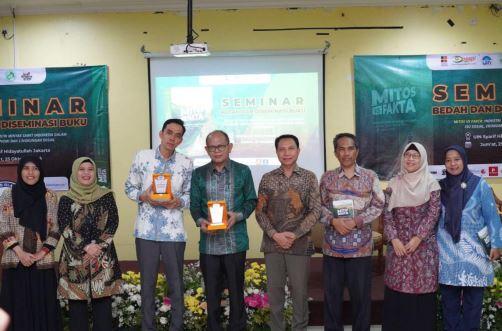South Tangerang - The Palm Oil Plantation Fund Management Agency (BPDPKS) and the Palm Oil Agribusiness Strategic Policy Institute (PASPI) in collaboration with the Agribusiness Student Association of UIN Syarif Hidayatullah Jakarta organised a book review and dissemination seminar. (HMJ) Agribusiness Department of UIN Syarif Hidayatullah Jakarta organised a book review and dissemination seminar entitled ‘Myths Vs Facts: Indonesia's Palm Oil Industry in the Social, Economic and Environment’ in commemoration of World Food Day 2024. The event The event was held at the Madya Hall of UIN Syarif Hidayatullah Jakarta on 25 October 2024.
Opening the book review seminar, Chairperson of the Agribusiness Study Programme at UIN Syarif Hidayatullah Jakarta, Mrs Rizki Adi Puspita Sari, M.M., in her speech said that together we should use the the momentum of Food Day to learn more about the Indonesian palm oil industry which has industry that has contributed greatly to global food production, which is certainly not free from challenges. challenges.
The next speech was delivered by the Vice Dean for Academic Affairs of the Faculty of Science and Technology, Dr La Ode Sumarlin M.Si. Ode Sumarlin M.Si, in his speech, he expressed his hope for the future so that we can utilise the opportunities that exist in the future. the future so that we can take advantage of the opportunities from the existence of the palm oil industry in Indonesia. Indonesia. On the same occasion, Vice Rector 3 for Student Affairs of UIN Syarif Hidayatullah Jakarta, Prof Ali Munhanif, M.A., Ph.D, revealed the importance of palm oil to the daily lives of Indonesian people. He also emphasised the role of the government in the palm oil industry in Indonesia, as well as the important role of students to build enthusiasm and concern for palm oil so that they can explore the world palm oil market.
Head of the BPDPKS Corporate Division, Achmad Maulizal, also revealed that there are several benefits of Palm Oil derivatives and among them are fossil fuels mixed from 35 palm oil biofuels which will be developed up to 40 to 50 by the President-elect, Mr Prabowo Subianto. This is utilised for transport. With palm oil, the purchase price is also more affordable. In addition to the benefits, it cannot be denied that there are also negative impacts such as forest fires, which is something that needs to be considered. to be considered. Nonetheless, the utilisation of palm oil is very evident because palm oil can be used from the top of the trunk to the tip of the roots. can be utilised from the top of the tree trunk to the tip of the roots. There are also benefits in many fields such as food, medical, and even fashion.
At the opening of the session, PASPI Executive Director Dr Tungkot Sipayung highlighted that despite Indonesia's decline in plantation commodities, the country remains the world's leading producer of palm oil. He quoted the statement that ‘Who controls food, controls people. Who controls oil, controls the nation’, to emphasise the importance of palm oil. The PASPI Executive Director and Chairperson of the Compilation Team for the Palm Oil Myths and Facts Book also spoke about Indonesia's efforts to maintain its palm oil advantage. conveyed Indonesia's efforts in maintaining the superiority of palm oil in the midst of competition with existing vegetable oils with a competitive price strategy. However, amidst the advantages palm oil, palm oil still faces economic, social, environmental, and health issues, including the negative stigma of cholesterol. negative stigma of cholesterol.
Then the presentation session was continued by Mr Dr Ir. Iskandar Andi Nuhung, MS. as the discussant of the book ‘Myths Vs Facts: The Indonesian Palm Oil Industry in Global Social, Economic and Environmental Issues, Fourth Edition’ related to economic issues. He said that palm oil has been a strategic commodity for Indonesia since the beginning of independence, opening up sustainable economic opportunities. Indonesia's geographical location right on the equator favours the growth of palm oil, with an ideal climate for high productivity. As a multifunctional crop, palm oil is fully utilised - from oil to fibre used in the automotive industry. With potential earnings of up to 20-25 million rupiah per production, oil palm plays an important role in national economic growth, job creation and rural development. Palm oil not only fulfils domestic needs, but is also the foundation of the global economy.
The second presentation was delivered by Prof. Dr. Ir. Siti Rochaeni M.Si. as the discussant of the book ‘Myths Vs Facts: The Indonesian Palm Oil Industry in Global Social, Economic, and Environmental Issues, Fourth Edition’ related to social issues. She discussed the 19 myths contained in the book related to social issues, which affect public perception of palm oil. He also talked about the obstacles in the development of ISPO certification in smallholder plantations that need to be overcome in order to ensure the sustainability and improvement of national palm oil quality. quality of national palm oil.
The last presentation was made by Prof. Dr Lily Surraya Eka Putri M.Env.Stud. as the discussant of the book review. ‘Myth Vs Fact: The Indonesian Palm Oil Industry in Global Social, Economic, and Environmental Issues. Fourth Edition’ related to environmental issues. She said that a number of myths about the environmental impacts of palm oil plantations are untrue, such as the issue of water depletion and land degradation, which are considered to be able to be overcome with peatland management and conservation. However, palm oil waste is still a challenge, especially liquid waste that has the potential to pollute the environment if not managed properly. Improved governance and monitoring of the palm oil industry is in line with the SDGs programme, particularly in relation to climate action and the conservation of terrestrial and aquatic ecosystems.

